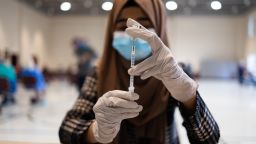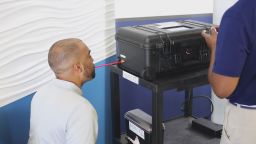New York State health officials are alerting the public to two new viral subvariants – offshoots of Omicron’s BA.2 virus – that are spreading more quickly through the central part of that state.
The new branches of BA.2’s family tree are BA.2.12 and BA.2.12.1. They are growing about 25% faster than BA.2, particularly in the central part, according to a news release from the New York state department of health.
These subvariants are now causing more than 90% of infections in Central New York and the neighboring Finger Lakes region.
Covid-19 cases are on the rise again in the United States overall, but they’re growing extra fast in New York state. Average daily cases in the state have doubled in a little over two weeks.
Daily reported cases are still a fraction of what they were at the height of the Omicron surge, but New York’s case rate is one of the highest in the country right now. Covid-19 hospitalizations have also started to tick up in the state, pushing some counties – especially those where the new subvariants have taken hold – into a “high Covid-19 Community Level” where the US Centers for Disease Control and Prevention recommends universal indoor masking.
It’s not the first time these subvariants have made an appearance. They’ve been reported in at least 50 US states and territories since January 2022, according to the website GISAID.org, a global effort to track the evolution of the virus that causes Covid-19. BA 2.12 has also been spotted in the United Kingdom, India, Germany and Canada according to the database.
It’s not clear whether they may eventually overtake BA.2 in areas other than New York.
“Time will sort of tell if we see them start to replace BA.2, the parent lineage, but for now, I don’t think people need to panic,” said Dr. Wesley Long, an associate professor of pathology and genomic medicine at Houston Methodist Hospital. “You can have regional variants that do very well in a region that sort of stay confined to that region,” said Long, who monitors variants as part of the ARTIC network.
Long said he identified over 80 Covid-19 cases in Houston caused by these subvariants since early January, when BA.2 first appeared. However, the subvariants do not seem to show any advantage over BA.2 in terms of spread or transmission in Houston.
The increased growth rate identified by New York state officials may not be an inherent property of these subvariants, but more likely something that’s happened “by chance,” Long told CNN.
“I know it can be frightening, but I think people should take comfort in the fact that essentially, the things we need to do to protect ourselves are the same things we’ve done in the past,” he said.
Health officials in New York agree.
“We are alerting the public to two Omicron subvariants, newly emerged and rapidly spreading in upstate New York, so New Yorkers can act swiftly,” said State Health Commissioner Dr. Mary T. Bassett, in the release.
Get CNN Health's weekly newsletter
Sign up here to get The Results Are In with Dr. Sanjay Gupta every Tuesday from the CNN Health team.
“While these subvariants are new, the tools to combat them are not. These tools will work if we each use them: get fully vaccinated and boosted, test following exposure, symptoms, or travel, consider wearing a mask in public indoor spaces, and consult with your healthcare provider about treatment if you test positive,” Bassett said.
According to data from New York’s Department of Health, cases and hospitalizations are rising in the state. Hospitalizations are rising more swiftly among unvaccinated people compared with those who are fully vaccinated, and they remain relatively low.





